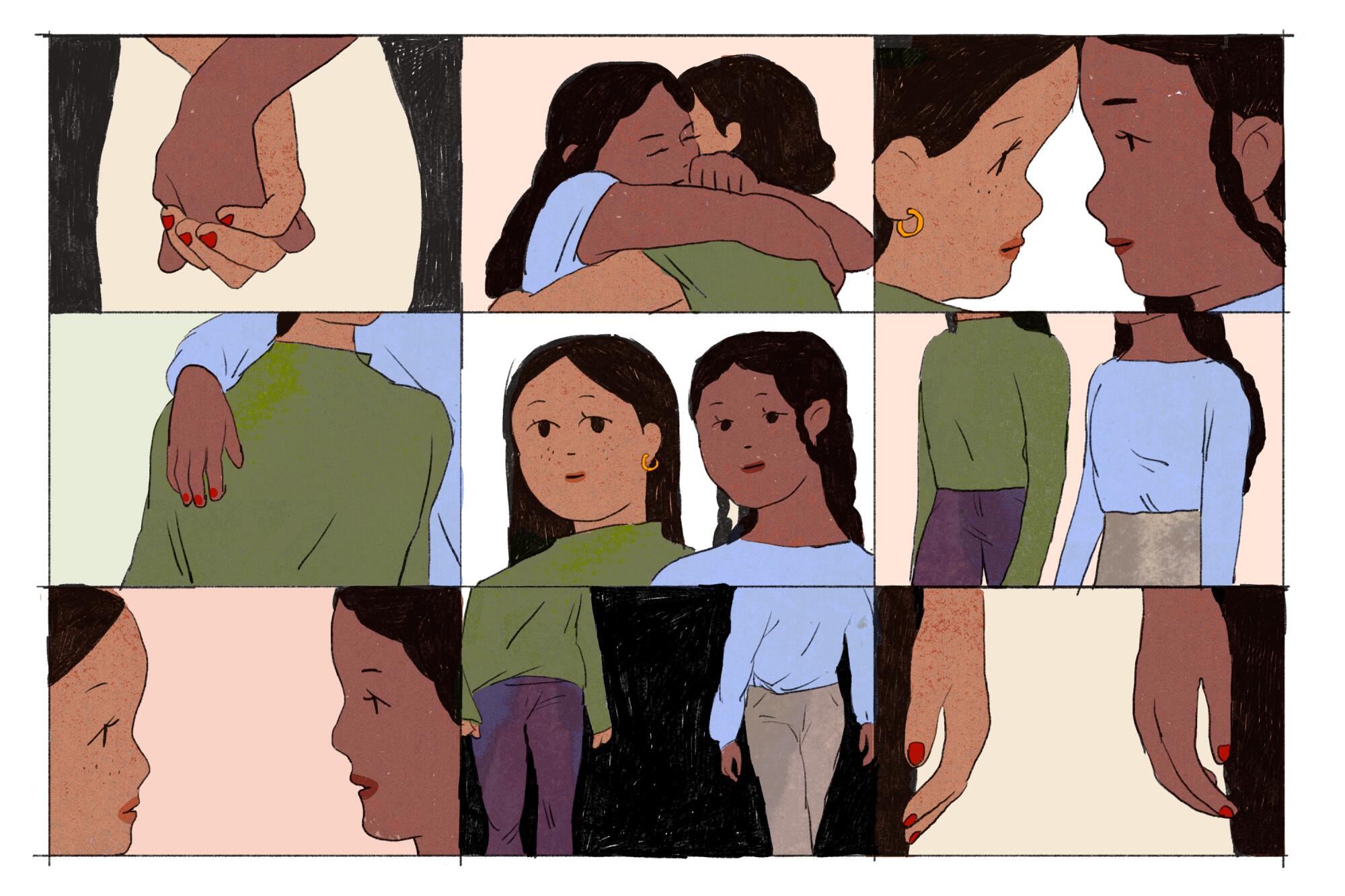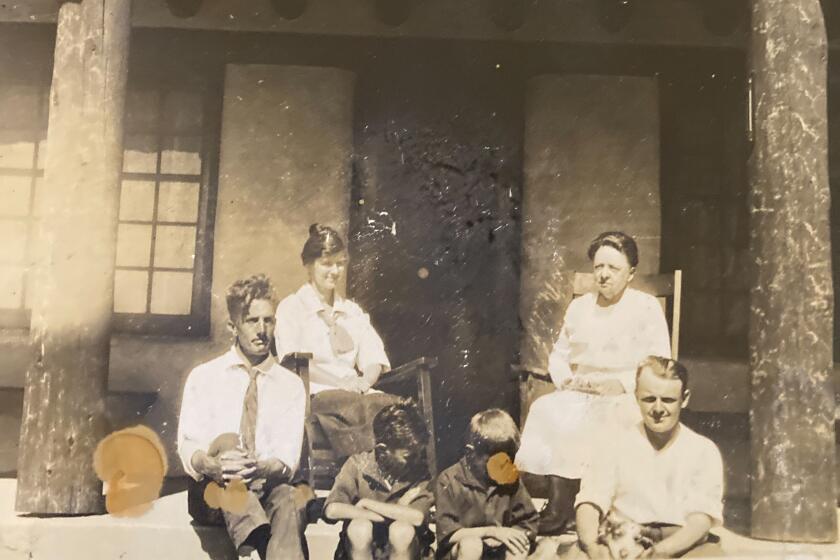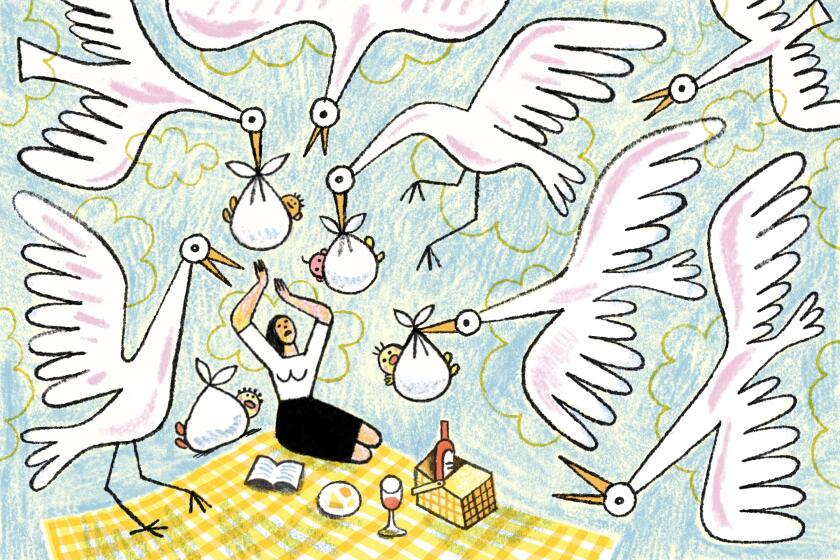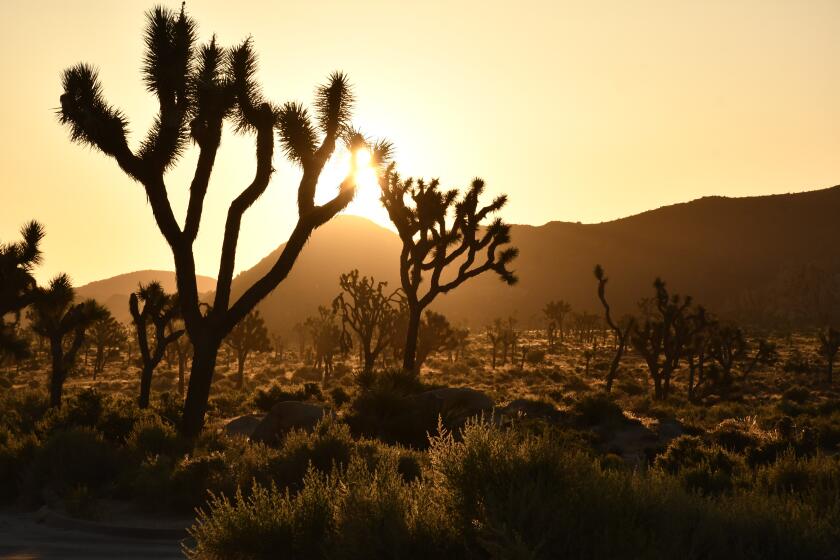
- Share via
I knew a monkey once.
She belonged to the woman who owned the hotel across the street from my childhood home in Ethiopia. The monkey spent her days climbing shoulders, playing with children and eating whatever food she was given. She became too difficult to keep when she hit puberty. She screamed a lot and broke things. Her owners tried keeping her on a leash for a while, but that did nothing to stop the nighttime noise.
One afternoon, a group of men drove the monkey to the forest at the edge of town and left her there. The assumption must have been that since she’s originally from a forest, any forest would do. That’s like deporting me to Mexico. The monkey ran after the car as far as she could as if to say: I do not know this place, please do not leave me behind.
I think about that monkey often.
In the small town where I grew up, my classmates at school would put an arm around my shoulder without asking for permission and we would sit like that for the whole duration of recess. On weekends, my cousin or a friend had me sit between her legs to braid my hair. Men held each other’s hands on the streets, rubbed shoulders and touched their friends’ lower backs. There was an unspoken entitlement to each other’s spaces and to varying degrees of touch.
My father’s family farmed on the Los Alamos plateau, before the land was seized to develop the first atomic bomb. Their lives there were among the many secrets they wrapped in a shroud of silence.
Intense friendships were common. I knew adult women who bragged about how they slept with their best friends: holding each other tightly, face to face. As teenagers, my friends and I used to kiss each other’s faces and necks repeatedly. During sleepovers, we hugged with the sort of passion we felt in our bones, in our hearts.
Yet, even as a child, I couldn’t wait to leave home. I had heard so much about America: its money, food, clothes, cars, running water, freedom. I moved to California at 17. Soon after I arrived, my older sister and I were walking around a strip mall in Westchester, when I put my arm around her shoulders as I used to do back home.
“Please take off your hand,” she said. “People will think we are lesbians.”
It’s been more than two decades since that day, but I remember exactly how I felt. Devastated.
My sister’s words announced the loss of platonic hugs and touches that were so integral to my well-being, my survival. Years later, I would learn that I am indeed a lesbian, so any part of me that was aware of this at the time must have shrunk out of fear.
I struggled to make friends in America and, when I did, none were like the friends I had in Ethiopia, who would touch me without asking and hug me tightly at night.
When someone like me leaves her natural habitat for a place like Los Angeles, where you have to travel miles to see the few people you know, a certain kind of madness begins to build up within. Everything else I was going through, being undocumented and struggling to continue school, was exacerbated by the utter aloneness I felt.
My body changed to accommodate my new reality. When a friend asked if we could cuddle and laid her head on my lap, I contracted and felt cold and wooden. I realized I could now only touch people with ease (beyond the basics, like handshakes) when there was romantic attraction.
The pressure to procreate comes from so many directions I’m considering pitching a “Walking Dead” spinoff where the child free are the living and everyone else are zombies trying to turn us.
When I was a teenager, before I left Ethiopia, a woman in her 30s confided in me that she could no longer sleep in that romantic way with her married friend because her friend’s husband had told his wife that what the two were doing was “lesbian” and must stop. That was the beginning of something. When I visited Ethiopia in 2018 after 17 years in the U.S., I noticed a drastic drop in hand-holding, touching and hugging between friends on the streets.
Over the last decade and a half, anti-gay hysteria in Ethiopia, mostly spearheaded by a nongovernmental organization with funding from American evangelicals, has popularized gay and lesbian identities and tied them to sexually transmitted diseases and pedophilia. This has given new meaning to activities people once casually engaged in with friends. Passionate same-sex friendships — even those that occasionally slipped into sex — had not been considered homosexual activities that required a rigid identity of gay or lesbian. So, the shades of platonic intimacy that filled the space between friendships and more permanent sexual relationships are vanishing. The edge of romance is now a cliff. In a way, it didn’t matter that I came to America because America would have come for me eventually.
I have wondered what my life would have been like had I stayed in the old Ethiopia where I was able to maintain romantic friendships. I’m not sure I would have needed to call myself a lesbian, or even queer. I know Ethiopian women who are married to men but maintain romantic relationships with women friends. Women who believe that “men are for family, and women for love.” I can imagine my life resembling theirs. Or unmarried, happy in the company of friends who provide me with physical intimacies of varying intensities.
In Los Angeles, disruptions kept me from my writing. But after a year in a cabin near Joshua Tree, coyotes keep me company and my fearlessness grows.
There is irony when a culture that rejects homosexuality because it is seen as Western turns around and throws out friendship traditions because of Western definitions. It is also ironic that the only way to recover the lost shades of friendship is to fully embrace the queerness within all of us, and the queerness that can exist in platonic relationships.
A few weeks after the removal of the monkey from the hotel, we heard that she was living in a village some five kilometers away, where she sat by the roadside begging people for food.
A home is lost twice: first when you leave it and then again when you return.
When I went back to my hometown for the first time in 21 years in March, another sister kept rubbing my arms and shoulders. It felt like an intrusion. Perhaps it is because I have long been unsure of how to receive her attempts to show affection considering that she and other family members have been begging God to cut my queerness out of me. Or maybe it’s just that I have been altered.
The forest is no longer my home, and neither is the hotel.
Mihret Sibhat is the author of “The History of a Difficult Child.”
More to Read
A cure for the common opinion
Get thought-provoking perspectives with our weekly newsletter.
You may occasionally receive promotional content from the Los Angeles Times.












